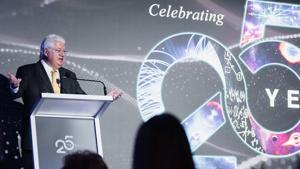Science
Perimeter Institute Marks 25 Years of Quantum Innovation

The Perimeter Institute for Theoretical Physics in Waterloo, Canada, celebrated its 25th anniversary on September 25, 2023. Founded by Mike Lazaridis, co-founder of BlackBerry, the institute has become a leading hub for research in theoretical physics and quantum science. The milestone event highlighted the institute’s significant contributions to the field and its role in shaping the future of technology.
Lazaridis’s journey began during his time as an electrical engineering student at the University of Waterloo. An informal lecture by Professor Lynn Watt introduced him to the groundbreaking experiments of physicist Alain Aspect, which confirmed the existence of entangled particles. This pivotal moment influenced Lazaridis profoundly, leading to the establishment of the Perimeter Institute in 2000 with an initial donation of over $100 million, representing a third of his fortune.
Reflecting on that transformative lecture, Lazaridis said, “The entire class was stunned. Some of us fell out of our seats, quite literally.” He emphasized the importance of unifying Einstein’s theory of relativity with quantum mechanics, suggesting that such a breakthrough could yield new technologies and industries.
The year 2023 also marks the United Nations’ International Year of Quantum Science and Technology, coinciding with the centenary of quantum mechanics founded by pioneering scientists, including Albert Einstein. During the anniversary celebration, approximately 200 attendees, including researchers, politicians, and Nobel laureates, gathered to acknowledge the institute’s achievements.
Since its inception, the Perimeter Institute has made significant strides in theoretical physics, cosmology, astronomy, and quantum computing. It has also developed educational curricula that reach high school students in 142 countries and contributed to the creation of advanced radio telescopes capable of detecting rapid bursts of radio waves from the universe.
One of Lazaridis’s proudest moments came in 2019 when the Event Horizon Telescope Collaboration released the first-ever images of a black hole, a feat made possible through technology developed at the Perimeter Institute. “We were part of that. Waterloo, Canada, contributed to that in a big way,” he remarked, recalling the excitement surrounding the publication in UK newspapers.
Among the distinguished guests at the anniversary was Art McDonald, a particle physicist who won the 2015 Nobel Prize for his work on neutrinos. McDonald announced a forthcoming $60 million experiment at SNOLAB, aimed at investigating dark matter particles, which are believed to comprise 85 percent of the universe’s matter.
Katie Mack, the Hawking Chair in Cosmology and Science Communication at Perimeter, stressed the importance of curiosity-driven research in fostering technological development. Mack, who authored the book “The End of Everything (Astrophysically Speaking),” aims to bridge complex scientific concepts to the public. She noted, “That is a really damaging feeling, it is really hard to get over that, and what I try and do in my communication is, you can understand it.”
Another notable attendee was Donna Strickland, who received the 2018 Nobel Prize for her work on lasers. She highlighted the unpredictable paths of foundational research, pointing out how past research on superconductivity has now become crucial in the realm of quantum computing.
The Perimeter Institute’s innovation ecosystem, which includes the Institute for Quantum Computing and the Quantum Valley Ideas Lab, is at the forefront of the quantum technology race. Lazaridis noted that the Quantum Valley Ideas Lab has already spun out its first company, which is developing quantum antennas and spectral analyzers.
With advancements in quantum cryptography and the potential for a quantum internet, the institute plays a vital role in addressing fundamental questions about the universe, such as the nature of dark energy and the mechanics of gravity. Carena Marcela, Executive Director of the Perimeter Institute, stated, “Deepening our understanding of how nature works ultimately leads to developing new technologies that touch people’s lives.”
As the Perimeter Institute embarks on its next chapter, its legacy of fostering scientific inquiry and innovation continues to inspire the next generation of physicists and technologists worldwide.
-

 Politics4 weeks ago
Politics4 weeks agoSecwepemc First Nation Seeks Aboriginal Title Over Kamloops Area
-

 World5 months ago
World5 months agoScientists Unearth Ancient Antarctic Ice to Unlock Climate Secrets
-

 Entertainment5 months ago
Entertainment5 months agoTrump and McCormick to Announce $70 Billion Energy Investments
-

 Science5 months ago
Science5 months agoFour Astronauts Return to Earth After International Space Station Mission
-

 Lifestyle5 months ago
Lifestyle5 months agoTransLink Launches Food Truck Program to Boost Revenue in Vancouver
-

 Technology3 months ago
Technology3 months agoApple Notes Enhances Functionality with Markdown Support in macOS 26
-

 Lifestyle3 months ago
Lifestyle3 months agoManitoba’s Burger Champion Shines Again Amid Dining Innovations
-

 Top Stories2 months ago
Top Stories2 months agoUrgent Update: Fatal Crash on Highway 99 Claims Life of Pitt Meadows Man
-

 Politics4 months ago
Politics4 months agoUkrainian Tennis Star Elina Svitolina Faces Death Threats Online
-

 Sports5 months ago
Sports5 months agoSearch Underway for Missing Hunter Amid Hokkaido Bear Emergency
-

 Politics5 months ago
Politics5 months agoCarney Engages First Nations Leaders at Development Law Summit
-

 Technology5 months ago
Technology5 months agoFrosthaven Launches Early Access on July 31, 2025




















